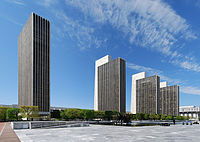Commission for the Preservation of the Republic: Difference between revisions
mNo edit summary |
mNo edit summary Tag: 2017 source edit |
||
| Line 18: | Line 18: | ||
| image_alt = | | image_alt = | ||
| formed = 1951 | | formed = 1951 | ||
| preceding1 = National | | preceding1 = Information Office of the National Revolutionary Army | ||
| preceding2 = <!-- up to |preceding6= --> | | preceding2 = <!-- up to |preceding6= --> | ||
| dissolved = | | dissolved = | ||
| Line 63: | Line 63: | ||
The '''Commission for the Preservation of the Republic''', or '''CPR''' is the {{wp|security agency|security}} and {{wp|intelligence agency}} of the [[the Cape|Federacy of the Cape]], responsible for counter-intelligence, foreign intelligence and national security. It is considered one of the most secretive organizations in the world. The Commission is not a cabinet-level department, it instead reports directly to the office of the [[Prime Executive of the Cape]]. It is considered the most powerful civilian body, and the most powerful state body outside of the [[Cape Armed Forces]]. | The '''Commission for the Preservation of the Republic''', or '''CPR''' is the {{wp|security agency|security}} and {{wp|intelligence agency}} of the [[the Cape|Federacy of the Cape]], responsible for counter-intelligence, foreign intelligence and national security. It is considered one of the most secretive organizations in the world. The Commission is not a cabinet-level department, it instead reports directly to the office of the [[Prime Executive of the Cape]]. It is considered the most powerful civilian body, and the most powerful state body outside of the [[Cape Armed Forces]]. | ||
Although its predecessor, the [[National | Although its predecessor, the [[Information Office of the National Revolutionary Army]], was a {{wp|secret police}} force, the CPR has lacked a large domestic wing since its founding following deposition of the [[National Reclamation Government]] and the country's return to democracy in 1951. As it posseses limited law enforcement powers domestically, internal security now officially falls to the [[Department of State of the Cape|Department of State]] and the various provincial police departments. However, state security functions remains the sole domain of the CPR. It is the only agency of the federal government focusing on intelligence gathering, {{wp|counterintelligence}}, and state security functions. Today, the CPR is officially responsible for the security of the Cape state, cyber operations, fighting against organized crime, terrorism, and drug smuggling. It is estimated to employ over 100,000 people worldwide, with a considerable covert {{wp|special forces}} wing. | ||
The Commission is still considered by some as a secret police force, with claims that it continues to operate widespread surveillance programs, conducts both foreign and domestic extrajudicial arrests and killings, and {{wp|paramilitary}} operations. Although not much is known about the organization, it is believed that the Commission is notably involved in foreign affairs. | The Commission is still considered by some as a secret police force, with claims that it continues to operate widespread surveillance programs, conducts both foreign and domestic extrajudicial arrests and killings, and {{wp|paramilitary}} operations. Although not much is known about the organization, it is believed that the Commission is notably involved in foreign affairs. | ||
Latest revision as of 02:07, 18 May 2023
 The emblem of the CPR | |
 CPR headquarters, thought to be in the Plaza of the Federacy | |
| Agency overview | |
|---|---|
| Formed | 1951 |
| Preceding agency |
|
| Jurisdiction | the Cape |
| Headquarters | Tower of State, Plaza of the Federacy Janosar, the Cape |
| Motto | "The eye of the people" |
| Employees | State secret - greater than 100,000 |
| Agency executive |
|
The Commission for the Preservation of the Republic, or CPR is the security and intelligence agency of the Federacy of the Cape, responsible for counter-intelligence, foreign intelligence and national security. It is considered one of the most secretive organizations in the world. The Commission is not a cabinet-level department, it instead reports directly to the office of the Prime Executive of the Cape. It is considered the most powerful civilian body, and the most powerful state body outside of the Cape Armed Forces.
Although its predecessor, the Information Office of the National Revolutionary Army, was a secret police force, the CPR has lacked a large domestic wing since its founding following deposition of the National Reclamation Government and the country's return to democracy in 1951. As it posseses limited law enforcement powers domestically, internal security now officially falls to the Department of State and the various provincial police departments. However, state security functions remains the sole domain of the CPR. It is the only agency of the federal government focusing on intelligence gathering, counterintelligence, and state security functions. Today, the CPR is officially responsible for the security of the Cape state, cyber operations, fighting against organized crime, terrorism, and drug smuggling. It is estimated to employ over 100,000 people worldwide, with a considerable covert special forces wing.
The Commission is still considered by some as a secret police force, with claims that it continues to operate widespread surveillance programs, conducts both foreign and domestic extrajudicial arrests and killings, and paramilitary operations. Although not much is known about the organization, it is believed that the Commission is notably involved in foreign affairs.